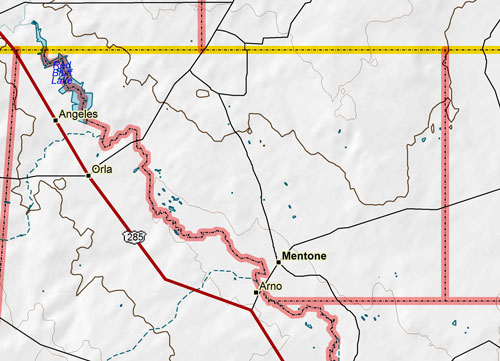|
Marker Title: Route of Old Butterfield Stagecoach Road
City: Mentone
County: Loving
Year Marker Erected: 1968
Marker Location: from Mentone, take SH 302 W .05 mi.
Marker Text: Over these tracks passed the Butterfield Stage, 1858-1861, providing for first time in history a combined passenger and mail service from Atlantic to Pacific coast. Operating westward from St. Louis and Memphis, John Butterfield's company used 1,350 mules and horses and 90 Concord coaches and wagons. Stages traveled rapidly, despite lack of real roads. A signal given approaching a station would assure food on table for travelers, and fresh horses ready. Stations were 12 to 113 miles apart. Route changes were often made to obtain water. The passengers and crew wore guns. Indians liked horses, so to reduce the danger of Indian attacks, mules were used west of Ft. Belknap. Trip one way took 25 days-- 7 consumed in crossing Texas, from near Preston (now under Lake Texoma) to Jacksboro, Ft. Belknap, Ft. Chadbourne, and El Paso. One-way fare for the 2,700 miles was $200. This marks a 113-mile span, from Emigrants' Crossing (82 mi. S) to Pope's Crossing (31 mi. N), that on inaugural trip, Sept. 16 - Oct. 12, 1858, had no team-change. Route ran parallel to Pecos River. By November there were 3 change stations in this area, one being Skillman's Stop (6 mi. N). Route was shortened in 1860, going by Forts Stockson, Davis and Quitman, west of the Pecos. Incise on base: Park site donated by Mr. and Mrs. N.F. Chapman, Pecos, Texas
Marker Title: Goodnight-Loving Trail
City: Mentone
County: Loving
Year Marker Erected: 1936
Marker Location: From Mentone, take SH 302 W .5 mile
Marker Text: Blazed from the Fort Griffin-Dodge City Trail, through New Mexico to Colorado about 1860 by Oliver Loving 1812-1867, first cattle trail driver from Texas.
Marker Title: Loving County
City: Mentone
County: Loving
Year Marker Erected: 1936
Marker Location: SH 302, Mentone at Courthouse
Marker Text: Formed from Tom Green County, created February 26, 1887. Organized July 8, 1893, named in honor of Oliver Loving, 1812-1867, farmer, rancher and an early trail driver. Mentone, the county seat.
Marker Title: Oliver Loving, C.S.A.
City: Mentone
County: Loving
Year Marker Erected: 1965
Marker Location: Courthouse, SH 302, Mentone
Marker Text: Only Texan instrumental in mapping 3 major cattle trails: Shawnee, Western and Goodnight-Loving trails. Born in Kentucky. Came to Texas 1845, to farm, haul freight, deal in cattle. Started large Palo Pinto County ranch. In 1858, drove herd to Chicago-- first time in history Texas cattle trailed to northern market. In 1859 drove to Denver. When Civil War broke out, 1861, was Confederate beef contractor, furnishing meat to army commissaries. Served on 24-hour patrol squad against Indians in frontier town of Weatherford. Mapped an 1862 expedition by 300 or more Texans to wipe out depredating Indians on the home grounds in Colorado, but failed to get necessary men to put this plan into action. After the war, with Charles Goodnight, drove cattle from Palo Pinto to Horsehead Crossing on the Pecos, then up the river to Indian reservations and forts in New Mexico. In 1867 on this trail, was shot by Comanches: crawled 5 miles, chewing an old kid glove for food. Hauled at price of $250 to Fort Sumner by Mexican traders, he had wounds treated, but died of gangrene. Partner packed corpse in charcoal, hauled him to Weatherford for burial, fulfilling last wish. Loving county was named for him in 1887.
Marker Title: Smallest County Seat in Texas - Mentone
City: Mentone
County: Loving
Year Marker Erected: 1967
Marker Location: SH 302 at Courthouse
Marker Text: Only town in Loving County-- last organized, most sparsely populated (both in total and per square mile) county in Texas. Established 1931 and named for an earlier town (10 miles north) which legend says was named by a French surveyor-prospector after his home on the Riviera. With population of 42, Mentone has no water system. (Water is hauled in.) Nor does it have a bank, doctor, hospital, newspaper, lawyer, civic club, or cemetery. There are only two recorded graves in county; some Indian skeletons, artifacts are found. Oil, farming, cattle country.
|

